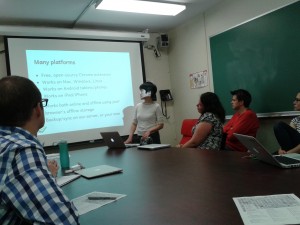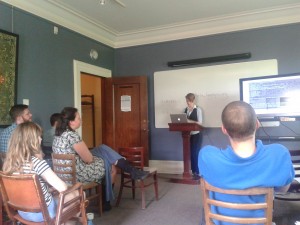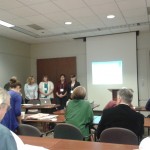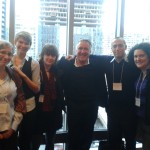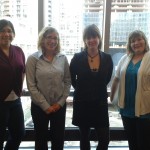By now most of my family, friends, and acquaintances are familiar with my views based on the things I write. I go on and on (and on and on) about the importance of maintaining environmental integrity in order to preserve our language and culture. And while environmental integrity is still a serious concern of mine, I wish to bring shift my attention towards language and culture.
We Mi’gmaq have been resisting colonial encroachment for centuries. We have fought colonialism and assimilation into the Canadian body politic. We have fought and continue to fight the exploitation of our lands and resources – speaking up on behalf of all our relations. While the fight against these forces has many battlegrounds, such as the forests, the waters, social media and the courts, the fight to preserve language is within: within our Nation, within our communities, within our families, and within ourselves. If the integrity of our territory is diminished, our language and culture are diminished with it. I have always asserted this. But the inverse has recently been brought to my attention: without Mi’gmaq language informing our values, we will partake in the destruction of our own territory. Indeed, we are now beginning to see Mi’gmaq individuals and communities using their lands and waters in ways that our ancestors would find objectionable. This change in values towards the integrity of our territory is a reflection of the lasting legacy of colonialism and assimilation, only hastened by the loss of Mi’gmaq language speakers.
The result is that we Mi’gmaq must make that extra effort to keep the language and culture alive. The only thing holding us back is ourselves. And I understand if this is a touchy subject. I don’t want to put blame on anyone or make people feel shame. Quite the opposite – I want nothing more than to see Mi’gmaq who are beyond proud of who they are and what they have, can, and will accomplish.
I wish to speak to the importance of a recent accomplishment. From my perspective, the Mi’gmaq Language Summer Workshop on Tuesday, August 6, 2013, was an absolute success. The speakers were eloquent, a natural occurrence when our People speak from their hearts. The food was fantastic. The booths were interesting and ranged from more formal ones to informal ones and the information they shared was of critical importance with regards to language retention and language revitalization. Perhaps this was why the discussions were so lively.
There were two things about this gathering that really caught my attention. The first was witnessing the Mi’gmaq Immersion Nursery students singing traditional songs with Pu’gwales, a local drum group. Not only are these children basically the cutest things ever, it was more than heartwarming to see them take pride in their accomplishments as the next generation of Mi’gmaq speakers. The other thing that piqued my interest was the interaction with Elders during the discussions towards the end of the workshop. I was fortunate enough to have been a moderator/note-taker for a group of roughly a dozen Mi’gmaq women.
I learned a lot about how the Elders feel about the language and how the Youth have or have not taken to it. One discussion in particular touched me on a personal level. Without sharing any names, I would like to relate what I have learned with readers. One of my relations talked about how she was confronted by her daughter one day. The daughter resentfully asked the mother why she had failed to pass her native language onto her at a young age. The mother was left speechless. It caught me off-guard to hear her say such a thing because my experience mirrors that of the mother – not the daughter.
Readers who know me may find this strange because I’m only 24 years young, but take note of what I am about to say. It is my experience, and possibly that of other Youth, that Elders sometimes resent the Youth for not already knowing the language. So we have arrived at a situation where Elders sometimes feel like the Youth resent them for not teaching them the language, while Youth sometimes feel as if the Elders resent them for not having learned the Mi’gmaq language. The level of misunderstanding between these two groups is the result of a breakdown in communication. This realization has bothered me since.
While learning the language in the most practical sense is vitally important, learning to forgive each other inter-generationally is a form of healing that I suspect will facilitate language learning and retention. All I can say is that this language workshop was a step in the right direction and it is critical as Mi’gmaq that we organize and participate in more of them. I believe that the importance of the Mi’gmaq language is the one thing we can all agree upon. And while many of us are busy becoming experts in our respective fields, we can all become experts of the Mi’gmaq language together. An “expert” is defined, by the way, as someone who has spent 10,000 hours on a subject. If you were to take a one-hour Mi’gmaq class every day for a year, it would take over 27 years to “officially” become an expert. While I love my Mi’gmaq classes, I think we can all agree that 27 years is unrealistic.
It is incumbent upon us to seek out avenues whereby we can integrate language into our daily lives. We need to take this issue to formal avenues such as Chief and Council, but also realize that the responsibility lies with us to raise the issue in informal avenues. There’s many ways to do this. Allow me to humbly suggest one. It would be great if people could just greet each other in Mi’gmaq. Those who already speak might discover other speakers and network with them, but speakers might also discover that there are people (Youth, such as myself, in particular) who are trying to learn. Learners need to hear Mi’gmaq spoken to them. They need to be prompted to listen. They need to struggle to understand. They also need to be prompted to speak. This effort can only serve to strengthen our language, our culture, and the bond we share as citizens of this paradise we call Mi’gmagi. Wela’lioq!

